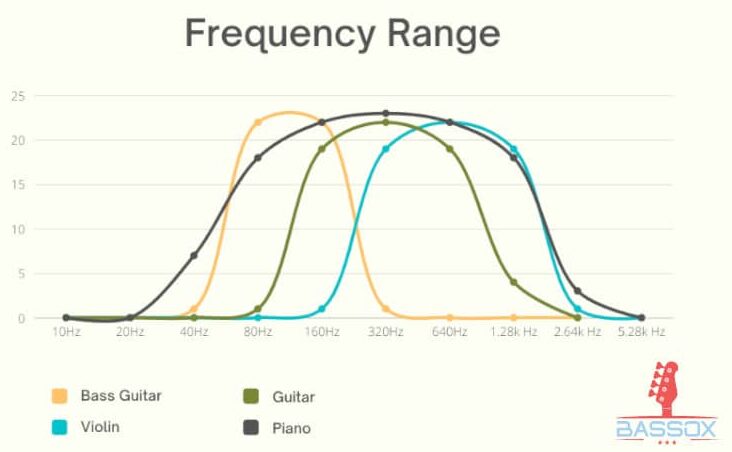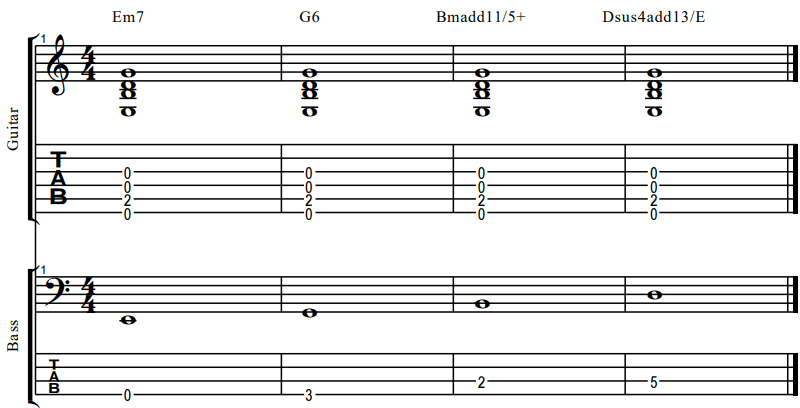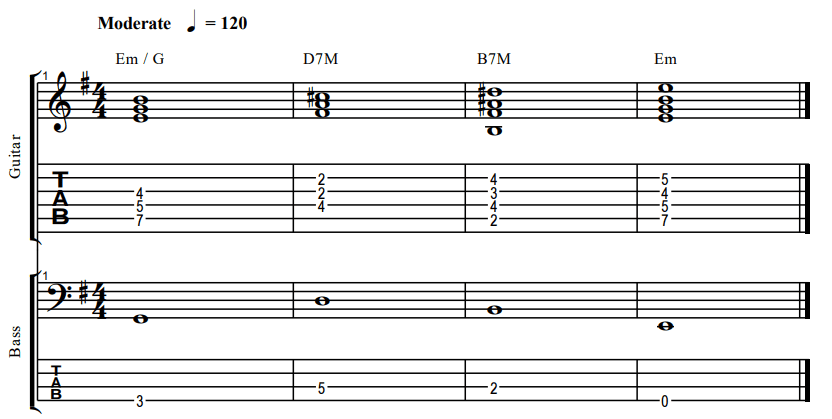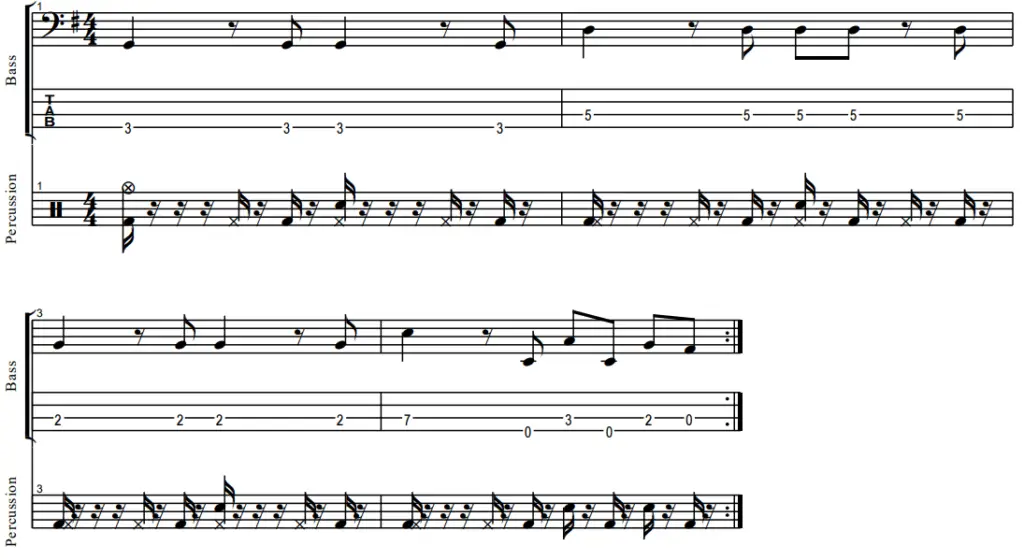After playing the bass for 15 years, I`ve heard lots of different opinions about how important the instrument is.
Most non-musicians who are unfamiliar with the bass are often curious about it. Oftentimes, they don`t know what makes the bass important in a band but are eager to learn about it.
In turn, there are some that claim the bass is a useless instrument in a band. Lastly, some think the bass is severely underappreciated and that it`s the most important instrument of all time.
In part, these viewpoints can be attributed to taste and preference. However, there also exist scientific data regarding the role and importance of the bass guitar. Therefore, I`ve compiled this data into this guide to showcase why the bass in fact is an important instrument.
1. Time Perception
A 2014 study conducted at Duke University made some major discoveries about how we perceive bass frequencies.
First off, we have a more accurate perception of musical time when listening to lower pitches.
The paper details an experiment where participants tapped along to notes of different frequencies. When the participants tapped along to higher frequency notes, their timing was less consistent. On the other hand, people had an easier time keeping staying on time when listening to deeper pitches.
Furthermore, participants were better at noticing off-beat notes and “mistakes” in time at lower frequencies. Using brain scans, they also noticed a stronger response in the participants, when lower notes were off-beat.
This in turn suggests that we feel, notice, and respond more strongly to bass frequencies.
Thus, we have an innate ability to notice rhythms better when they are played at bass frequencies. It is the bass that makes us perceive the rhythm of the song. The bass is also the instrument that makes us tap our feet and dance.
It thus follows that the bass is important, as it makes us feel the music more clearly, and connect with the groove of a song on a more active level.
2. Wider Sound
A big part of what separates great bands from good bands is how effectively they fill the frequency spectrum.
The bass guitar has a deep frequency range, with its lowest note having a frequency of 41.2Hz. Few other instruments can play this low, and the bass thus usually fills the deeper ends of the frequency spectrum.
Thus, while having a bass player is not a necessity, most bands prefer having one. This is because having a bass player is important for a band to attain a wider sound and prevent them from sounding hollow.

To get a better grasp of this, it can be helpful to listen to bands without bass players. These bands still generally sound good, but they also tend to have a more hollow sound than most bands.
Some bands accept the lack of low-end and write songs accordingly. Other bands without a bass player solve this by having guitars, keyboards, samples, or cellos fill in the low-end instead.
Either way, this all illuminates how important the bass guitar is in a band. Even if we don`t clearly make it out in a song, it is still impacting the overall sound of the band. Thus, the bass guitar is far from a useless instrument, even though it is often hard to hear.
3. Bass tone dictates how songs feel
An often overlooked but massively influential part of a band`s sound is the tone of the bass.
To better understand why bass tone is so important, let`s compare two popular songs.
The first of these is Starlight by Muse. On this track, Chris Wolstenholme has an unconventional, fuzzy, distorted, and octave-shifted tone. It takes up a lot of space in the mix, which works well because the instrumentation is otherwise minimalistic.
Thus, the thickness and heavyness of the bass fits well on this track, despite it being a tranquil song. This is because it would sound incredibly hollow, if the bass was unable to take up all this space in the mix.
Now, let’s compare this to Coldplay`s song Yellow.
The bass takes up moderate amounts of space in the mix. Guy Berryman achieves this by filling in the low end with a smooth and more conventional bass tone.
This works well for the track as it has much fuller instrumentation than Starlight has. As a result, the bass does not need to take up as much space to do its job well.
These two tracks have many similarities. They are both fairly slow, have simple verses, and have explosive interludes. Yet, the bass tone on the two tracks is vastly different, which has a massive impact on the overall feel of them.
With Yellow`s bass tone, Starlight would sound dull, hollow, and lack drive. Yellow with Starlight`s bass tone would sound overly noisy, the bass would clash with the guitars, and the verse would lose its tranquili character.
Thus, whether we pay attention to it or not, the tone of the bass is extremely important, as it impacts what the other instruments and the rest of the song sound like.
4. It provides the harmonic foundation
The most important note in a chord is always the deepest one. This is because it dictates the feeling and function of the whole chord, and can completley change it`s harmonic context.
The bass guitar almost always plays the lowest note of a chord in bands. Thus, despite generally playing single notes, this single note also tends to be the most important note of the chord.
To better illusrtarte this, here is the same guitar chord played 4 times, but with differing bass notes:

Here, the guitar plays the same notes, E, B, D, and G in the exact same way 4 times. Yet, due to the bass note of the chord changing, the sound of the whole chord also changes.
This happens because the lowest note of a chord always dictates how we perceive it in a harmonic context.
Here is a more practical example of the bass changing the chord progression:

Here, the bass plays a G under the Em chord of the first bar, but an E underneath it in the fourth bar. This gives the first Em/G chord a suspended character, wheras the last Em sounds tensionless.
In the second bar the guitar does not play the root note of the D7Maj chord at all. Instead, we only find this note in the bass line. This creates an harmonic interplay between the bass and the guitar, where the sound of their parts change completley depending on whether you listen to them together or not.
Thus, while it`s common to listen to the guitar or the piano when percieving chords, it is ultimatley the bass that dictates what the chords feel like.
5. It makes the drums sound better
The bass guitar and drums make up the rhythm section in a band. Together, they provide a groove, beat and a pulse to the song.
What this groove sounds like to a listener is heavily dependent on the interplay between the bass and the drums.
Without the drums, the bass would not be able to provide enough punch or percussiveness. Similarly, drums lack the melody and sustain needed to sound connected to the rest of the band without the bass.
Thus, the bass guitar fills an important role in a band by making the drums sound better and more cohesive. For a basic example of this, here is the bass line from the example above, played over a drum groove.
While this works, there is a lot more that can be done here. The bass could for example accentuate the kick drum more, rather than play sustained notes.
Here is an example of what a more groovy bass line would sound like over the same drum beat. Notice how the bass and kick drum emphasize the same notes.

Harmonically, there is no change in the bass line except during the bass fill at the end. Thus, this difference in groove has mainly been achieved by changing the rhythm of the bass line, not the pitch.
As a result, the bass plays a crucial part in making the drummer sound good. And if the drummer in a band doesn`t sound good, no one is sounding good.
6. It bridges the melody & rhythm
Above, we have seen how the bass grooves with the drums and provides harmony to chords at the same time. As the bass is the only instrument in a band that does both, it creates a “bridge” between the two.
Because of this, the bass is commonnly reffered to as a bridge instrument. Because of this, the bass fills an incredibly important role in a band, as bands without bass would not sound as cohesive and connected.
To get a better idea of how this works, here is the guitar and drum part from above, without the bass line:
In one sense, there is nothing wrong with this clip. It`s in time, and the instruments don`t clash rhythmically or harmonically.
However, they don`t sound connected and cohesive. Rather they sound thin , hollow and seperated.
The guitar is just playing sustained whole notes that neither infringe or support the drum beat. The drums provide a percusive rather than melodic element to the song which adds nothing to the harmony. Thus, the guitar and drums moreso coexiststing rather than work together.
Now, let`s add in the bass line from above and see what the 3 instruments sound like together.
Now, the chords have a more clear and interesting harmonic foundation. Likewise, the bass is working together with the drum beat rhytmically, while adding a melodic element to it.
This is how the bass bridges the gap between melody and rhythm. It exists in both sections at once, which in turn makes the whole band sound more connected.
7. Bands follow the bass
Every band tends to have 1 member that they follow when playing together. While this is hard for a listener to notice directly, which instrument the bands follows has a massive impact on the tightness of the band.
The vast majority of the time, bands either follow the bass player or the drummer. There are several reasons why following the bass guitar makes sense, here are the 3 major ones:
- It`s connected to every instrument: As a bridge instrument, the bass is the only instrument that every member of the band can latch onto both melodically and rhythmically. This is a big reason why the bass is hard to play, as the bass player is often responsible for connecting every piece of the band.
- It plays a steady groove: Bass lines are generally repeated and played for long durations of a song. This makes bass parts easy to follow along to and makes it easier to jump back in for a band member that loses their rhythm.
- The bass is felt: Since we feel deeper rhythms, the bass is an easy instrument to follow without paying much attention to it. Thus, as opposed to thinking about following the bass, members of the band often simply do “what feels natural”. As we react the strongest to deep frequencies, it is also thus natural for us to follow along to the bass.
Conclusion
With that, I find it fair to conclude that the bass fills an important role in bands.
We respond more strongly to low frequencies and the bass expands the frequency spectrum a band can play at. Furthermore, bass tone makes a massive difference to the overall feel of a song.
We have also looked at how the bass interacts with the other instruments in a band.
By playing in both the rhythm and melodic section at the same time, all the members of a band are in constant interplay with the bass. For this reason, the bass lays both the rhythmic and harmonic foundation in a band, and is often the instrument that other musicians follow.
Thus, while there are several reason why the bass is hard to hear in songs, this doesn`t mean that it is unimportant. In fact, when considering all of these above reasons, I find it hard to call the bass anything but one of, if not the most important instrument in a band.

